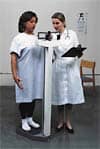“The issue for the field is that the genetic approach to sleep is very underdeveloped,” SLEEP 2006 keynote speaker Allan I. Pack, MBChB, PhD, told Sleep Review on Tuesday. However, because there is no shortage of patients with sleep disorders in the United States, he added that sleep medicine “could catch up very quickly.”
In his keynote speech, Pack told sleep professionals gathered in Salt Lake City, Utah, for the annual meeting of the Associated Professional Sleep Societies (APSS), that future research will likely find more genetic links for all types of sleep disorders and that this will present an opportunity for the field to shift from treatment to prevention of disorders. “We will move medicine from managing disease to managing risk,” he said.
Pack’s current research focus includes the molecular mechanisms for sleepiness and sleep apnea. He is pursuing studies of the genetics of sleep apnea in Iceland because of the island nation’s unique combination of good genealogical records, long history of isolation, and current widespread public and institutional support of genetic research. “No one else has that infrastructure,” he told Sleep Review.




